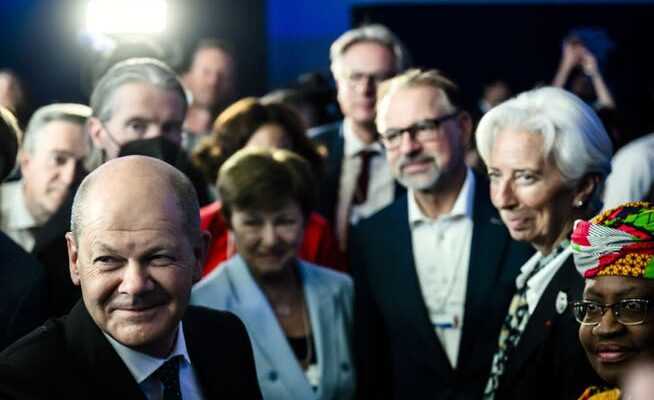On the final day of the 2022 annual meeting of the World Economic Forum (WEF) in Davos, German Chancellor Olaf Scholz confidently declared that Putin would not win the war against Ukraine. He did not respond to the criticism of Germany’s hesitant support. He campaigned for a world of togetherness and international cooperation.
Federal Chancellor Olaf Scholz sees deglobalization as a dead end. At the WEF 2022 he met, among others, ECB President Christine Lagarde (second from right).
Russia’s brutal war against Ukraine is also the greatest challenge for him as a person, said German Chancellor Olaf Scholz in an interview with WEF founder Klaus Schwab in Davos on Thursday. He worries about the people every day, including whether the war will one day go beyond Ukraine. The horrors and worries, Scholz concluded, should not be pushed aside. Rather, they should be an incentive every day to do everything possible to end the war as quickly as possible.
Warm words instead of weapons
Even if Scholz is relieved of his worries and desire for an early end to the war: the Chancellor did not give any new assurances for Ukraine. “We support Ukraine,” Scholz assured the audience. And: You can rely on Germany as an ally.
In the run-up to Scholz’s appearance, the WEF participants were probably most concerned with the question of whether the Chancellor would deviate from Germany’s hesitant attitude in supporting Ukraine in the war against Russia and support the Ukrainians more offensively, as they demanded in Davos had. But those who had hoped for explicit new assurances were disappointed. Scholz refrained from surprises and reiterated that Germany’s support was closely coordinated with partners and allies. At the same time, Scholz also made the limits of support clear. Nothing will be done that will turn NATO into a war party.
It is about making it clear to Putin that there will be no dictated peace, Scholz explained with a view to Ukraine. They will not accept such a person, and neither will Germany. To justify the German position, Scholz emphasized that Germany was delivering weapons to such a war zone for the first time. For Germany, this is actually a step that should not be underestimated. This would have been unimaginable before the start of the Ukraine war, but has now almost become a matter of course.
Germany lags behind the wishes
Scholz referred to the U-turn that his country had made in defense policy, so that Germany could defend itself and the alliance at any time, even in the new reality. The Chancellor recalled that Germany would allocate 100 billion euros for the modernization of the armed forces in the next few years and concluded that Germany could be counted on.
With the supposedly encouraging assurance, however, Scholz fell well short of the wishes of the Ukrainians. In Davos, their delegation had made it unmistakably clear that they regarded rapid deliveries of heavy weapons as the best form of humanitarian aid. The strengthening of the Bundeswehr, which Scholz led, which anyway does not intervene in combat operations, is hardly what the Ukrainians were hoping for.
Klitschko bemoans German clumsiness
Earlier in the morning, the Mayor of Kiev, Vitaly Klitschko, gave an impressive account of the current situation in Ukraine. There have been many discussions about Germany and also criticism, said Klitschko. Germany should now make the right decision and not allow itself to be held hostage by Russian natural gas and oil supplies. He thanked Germany that the country was now providing more support for Ukraine (“In the beginning there were only 5,000 helmets”). However, Klitschko also criticized the fact that the aid from Germany was progressing very slowly. In Davos, the entire Ukrainian delegation repeatedly pointed out how essential it was for them to obtain weapons as quickly as possible in the fight against Russia.
After all, Germany is now trying to become independent of energy imports from Russia. This is a major challenge for the industrialized country. However, weakening Russia to such an extent that it refrains from going to war is proving to be more difficult than hoped. The turmoil on the energy markets has led to rising prices, which are also bringing higher income to Russia.
Committed plea for a world of togetherness
During his appearance in Davos, the German Chancellor spoke of the need to become independent from Russia. In a plea that was passionate by his standards, he also campaigned for a world in which everyone does not just pursue their own interests, but where global cooperation for mutual benefit is sought on many levels. The new world has become multipolar, Scholz explained in a larger tour d’horizon. However, he does not believe in the narrative of a new bipolarity between the USA and China.
Scholz referred to the global consequences of the war in the form of impending hunger crises. You have to show solidarity with those affected. The social democrat emphasized the opportunities offered by globalization. He countered fears of a reduced global political influence of the industrialized countries. There would be no threat in countries with growing economic importance having a say. Instead, Scholz called for trade and cooperation between the different countries and regions to be deliberately promoted. The Federal Chancellor was optimistic that this would succeed. The alternative – everyone for themselves and at the same time
everyone against everyone – be even for the greatest powers
associated with excessive risks and costs. It remains to be hoped that Scholz will be right with his optimism.
